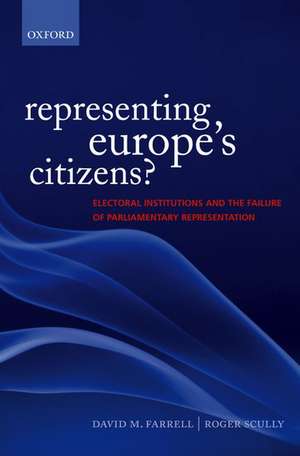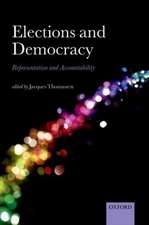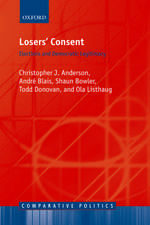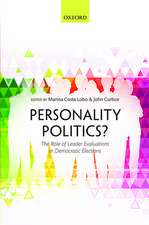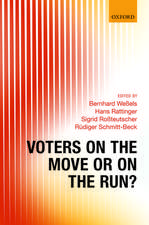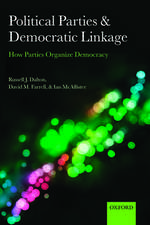Representing Europe's Citizens?: Electoral Institutions and the Failure of Parliamentary Representation
Autor David M. Farrell, Roger Scullyen Limba Engleză Hardback – 17 mai 2007
Preț: 425.82 lei
Preț vechi: 587.32 lei
-27% Nou
Puncte Express: 639
Preț estimativ în valută:
81.48€ • 85.29$ • 67.82£
81.48€ • 85.29$ • 67.82£
Carte tipărită la comandă
Livrare economică 19-25 martie
Preluare comenzi: 021 569.72.76
Specificații
ISBN-13: 9780199285020
ISBN-10: 0199285020
Pagini: 256
Ilustrații: numerous tables and figures
Dimensiuni: 164 x 241 x 20 mm
Greutate: 0.53 kg
Editura: OUP OXFORD
Colecția OUP Oxford
Locul publicării:Oxford, United Kingdom
ISBN-10: 0199285020
Pagini: 256
Ilustrații: numerous tables and figures
Dimensiuni: 164 x 241 x 20 mm
Greutate: 0.53 kg
Editura: OUP OXFORD
Colecția OUP Oxford
Locul publicării:Oxford, United Kingdom
Recenzii
Overall, this book offers a compelling model of how to analyze the connections between the traits of electoral systems and the behavior of representatives...The authors' stated goals for this book were to contribute to the understanding of the politics of the EU and to the understanding of the politics electoral systems. They have been achieved admirably.
Notă biografică
David Farrell is Jean Monnet Chair in European Politics and Head of the School of Social Sciences at the University of Manchester. Professor Farrell has published extensively in the field of parties, electoral systems and parliamentary representation (particularly focused on the European Parliament), including most recently, The Australian Electoral System, published in 2006. He is currently updating his best-selling textbook, Electoral Systems: A Comparative Introduction.Roger Scully is Reader in Political Science and Director of the Jean Monnet Centre for European Studies at the University of Wales, Aberystwyth. Dr Scully has published extensively on the politics of the European Parliament, and more generally on issues of political representation. He is author of Becoming Europeans? Attitudes, Behaviour and Socialisation in the European Parliament (OUP, 2005).
